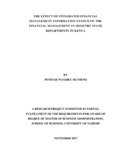| dc.description.abstract | The Government of Kenya introduced Integrated Financial Management Information Systems (IFMIS) to address the challenges with the existing system aiming to increase efficiency in service delivery by increasing efficiency, increase transparency and reduce government wastage. This is one of the Public Financial Management (PFM) reforms undertaken by the government to address challenges faced by most developing countries in managing their finances and to conform to international standards and requirements. This study sought to establish whether all ministry state departments had adopted the use of IFMIS in their financial management. This study sought to find out the effectiveness of Integrated Financial Management Information System and to: analyze the effectiveness of cash management and budgeting systems in ministry state departments; analyze the effects of financial reporting systems and the effects of transparency and accountability. The study adopted a descriptive research with a targeted population of 35 Ministry State Departments in Kenya. Out of the 35 distributed questionnaires, 26 were filled and returned. The study used primary data which was collected by use of structured questionnaires relating to the specific objectives of the study. The study used both qualitative and quantitative methods of data analysis. Collected data was first coded and later analyzed using Statistical Package for Social Sciences (SPSS) information derived from the research questions. Descriptive and inferential analysis techniques were adopted to test study hypotheses. Descriptive analysis comprised of mean, standard deviation, coefficient of variation, skewness and kurtosis while inferential analysis comprised of correlation analysis, Analysis of Variance (ANOVA) and multiple linear regression analysis. The study found that cash management and budgeting systems, financial reporting systems and organizational transparency and accountability positively and significantly influenced financial management in ministry state departments. This study concludes that for financial management to improve significantly, there has to be improvement in cash management and budgeting systems, financial reporting systems and transparency and accountability since there was a positive and significant relationship in the variables. The study recommends that IFMIS should not only use IFMIS to conform to technological requirements by automating all functions, but as a PFM reform that affects how transactions are run across all ministry state departments and that managers should ensure that financial reports are easily and promptly availed to enable decision makers make reliable decisions. | en_US |



